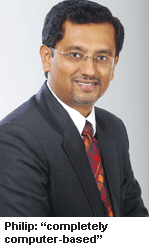 The US-based Educational Testing Service (ETS) and transnational triumvirate of the British Council, Cambridge ESOL and IDP Australia which together administer the English language proficiency tests TOEFL (Test of English as a Foreign Langauge) and IELTS (International English Language Testing Service) respectively to over 2 million school-leaving students aspiring to higher education in the US, Britain, Australia, Canada, New Zealand etc, are confronted with the prospect of formidable competition.
The US-based Educational Testing Service (ETS) and transnational triumvirate of the British Council, Cambridge ESOL and IDP Australia which together administer the English language proficiency tests TOEFL (Test of English as a Foreign Langauge) and IELTS (International English Language Testing Service) respectively to over 2 million school-leaving students aspiring to higher education in the US, Britain, Australia, Canada, New Zealand etc, are confronted with the prospect of formidable competition.
The London-based book publishing, media and education conglomerate Pearson Plc (annual sales revenue (2008): $6,963 million or Rs.32,726 crore), which owns Penguin Books, the Financial Times, Pearson Longman etc, has launched a rival computer-based English language proficiency testing service christened Pearson Test of English-Academic. “The distinguishing feature of PTE-Academic is that it is a completely computer-based English language proficiency assessment test inasmuch as students take the test at computer terminals in secure Pearson VUE test centres, it is assessed by computers and test results are delivered online. This process has a turnaround time of less than one-fifth required by the other two major English langauge testing services,” says John K. Philip, the Noida-based country manager of Pearson Language Tests, a division of Pearson Plc.
An English literature postgraduate of Delhi University, Philip began his career in academics with IDP Education Australia (1996-2000) and moved on to work with the British Council for the next six years (2000-2006) before signing up with Fortis Healthcare to train nurses for the global market (2006-08). After a short spell with the Noida-based Liqvid e-learning, early last year (April) he was head-hunted by Pearson VUE to launch PTE-Academic in India.
“I believe that the new ICT (information communication techno-logies) media are eminently suited for teaching and testing English language LSRW (listening, speaking, reading and writing) skills. They offer students instant access to the best teachers and examiners and compress testing and assessment processes substantially. For instance IELTS is written over two days, and while TOEFL offers the option of online testing, assessments of its essays and speaking modules are done by human examiners. On the other hand PTE-Academic is a comprehensive computer-based test, which is written online in designated Pearson VUE testing centres with high security features. Answer papers are marked by sophisticated scoring engines, with provision made for human intervention as a safety net,” says Philip.
Another advantage of the computer-based PTE-academic is that test results can be e-mailed to as many institutions as candidates choose. “In the three months since it has been introduced in India, the response has been excellent. I am confident that of the 350,000 Indian students who write IELTS and TOEFL annually, a steadily growing number will switch to PTE-Academic. This diver-sification into English language proficiency testing is one of the largest investments made by the Pearson Group in recent times, and the fact that it has already been accepted as the equivalent of TOEFL and IELTS by nearly a thousand university programmes around the world, is enough proof that this is the future of English language testing,” says Philip.
Dilip Thakore (Bangalore)